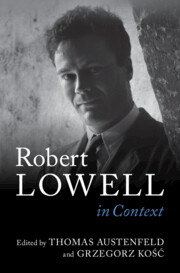Book contents
- Robert Lowell in Context
- Robert Lowell In Context
- Copyright page
- Dedication
- Contents
- Contributors
- Acknowledgments
- Abbreviations
- Introduction
- Part I Places
- Part II American Politics, American Wars
- Part III Some Literary Models
- Chapter 8 Classics
- Chapter 9 Melville
- Chapter 10 Plaints
- Part IV Contemporaries
- Part V Life, Illness, and the Arts
- Part VI Reputation and New Contexts
- Further Reading
- Index
Chapter 8 - Classics
from Part III - Some Literary Models
Published online by Cambridge University Press: 28 March 2024
- Robert Lowell in Context
- Robert Lowell In Context
- Copyright page
- Dedication
- Contents
- Contributors
- Acknowledgments
- Abbreviations
- Introduction
- Part I Places
- Part II American Politics, American Wars
- Part III Some Literary Models
- Chapter 8 Classics
- Chapter 9 Melville
- Chapter 10 Plaints
- Part IV Contemporaries
- Part V Life, Illness, and the Arts
- Part VI Reputation and New Contexts
- Further Reading
- Index
Summary
Evocations of Classical Greece and Rome pervade Robert Lowell’s entire oeuvre. His fascination with Latin literature in particular shaped his own poetry. The density and involved syntax of Virgil and Propertius are echoed in the crabbed and tortured involutions of Lowell’s earlier poetry. His confessional verse is in part a response to Catullan frankness. His view of America as declining from republic into empire was colored by the historiography of Suetonius and Tacitus, in whose portraits of imperial tyrants Lowell found a frame for depicting the darker elements of his own character. He essayed many (usually very free) translations or versions of Greek and Roman poems, often with autobiographical inflections. A number of “original” poems can be shown to have originated as translations from Catullus, Virgil, Propertius, or Horace. In contrast with his almost obsessive engagement with Roman literature, Lowell’s engagement with Greek was less extensive, often mediated through later European literature, and (notably in his versions of Aeschylus) less vivid.
- Type
- Chapter
- Information
- Robert Lowell In Context , pp. 87 - 97Publisher: Cambridge University PressPrint publication year: 2024

